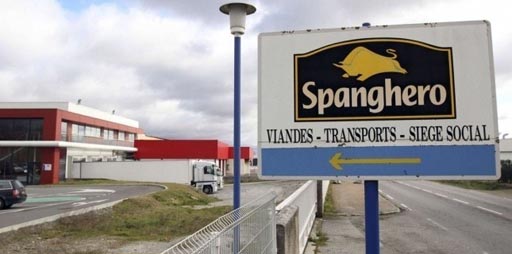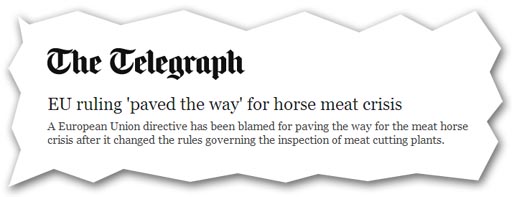L'Express, for instance, says there is no doubt that Spanghero is the heart of the fraud. The company's denials, it says, become "increasingly difficult to believe". The French fraud investigators (DGCCRF) have some 1,500 pages of invoices, which they say provides "overwhelming evidence" of the origin of the meat.
The official codes used on such documents, prescribed by law on the Customs website of the European Commission, are 0205 0080 horsemeat against 0201 0202 for beef. It was the latter code used to describe the product sent by Spanghhero to Comigel. And the same story is run by Le Figaro, which says that the evidence of the invoices is "damning".
The British media, it seems, has not caught up with this and is thus largely offering a fact free diet of opinion and misinformation, dressed up as news. Prize of the day (so far) goes to the Sunday Telegraph, rehashing a story from the Financial Times a few days ago.
The FT headlined its story, "Pressure grows to reform light-touch regulation", and this mantra is faithfully repeated by ST journalist Patrick Sawer, who retails a story headed "EU ruling 'paved the way' for horse meat crisis".
Sawer's lament is that a "directive issued by EU officials in 2006" scrapped daily inspections at cutting plants, following which plant operators were given advance notice of FSA visits, sometimes as far ahead as two months – thus allowing them to prepare for inspections.
Straight away, however, the man displays the all too typical ignorance of the breed, telling us that the "directive" is entitled " Regulation (EC) 854/2004: Official controls on products of animal origin intended for human consumption". A Regulation, of course, is not a directive.
More to the point, the Sawer abbreviates the title of the Regulation, the omission being crucial to the understanding of his piece, and the context of the complaints he retails.
The missing part of the title tells you this is an EC regulation "laying down specific rules for the organisation of official controls", focusing them on the regulators and the system of control. Thus, the official version is sub-titled: "Requirements and responsibilities of Competent Authorities".
This, in itself, should be part of the story, for this one regulation is part of a suite of legislation which starts with Regulation 852/2004 on the hygiene of foodstuffs – a general regulation covering all food – and takes in Regulation (EC) No 853/2004 covering foods of animal origin, applying to slaughterhouses and cutting premises.
These two regulations apply to "food business operators" and then, unusually, you have in 854/2004 a very specific regulation which does not apply to the food industry, but to the enforcers, instructing "competent authorities" on how they should implement the regulations applicable to the food operators.
However, the complaint retailed in the ST is that, from a requirement of full-time supervision of cutting premises by a vet, the official veterinarian is now mandated to be present when meat is being worked in cutting plants, only "with a frequency appropriate to achieving the objectives of this regulation".
If it is then appreciated that the objectives of the regulation are to introduce a risk-based system of control, using HACCP principles, the regulations effectively require veterinary presence to be reduced when an approved HACCP regime is in place.
However, this vital detail about HACCP is omitted from Sawer's piece, allowing him to retail a complaint that the adoption of "the lighter touch regime led to a dramatic drop in standards, with the number of inspectors falling from 1,700 during the 1990s, to around 800 today".
Anyone who can seriously argue that the adoption of HACCP represents a "lighter touch" clearly has no idea of how the system works. What we have here is not a lighter regulatory regime, but a different one, based on a completely different control philosophy.
All is explained though when the source of the complaint is revealed, as Ben Priestley, Unison national officer – a trade union official charged with maximising the employment opportunities for his meat inspector members. Says this highly partisan source: "It is most likely that the fraudulent meat entered the food chain in the cutting room. Inspectors would have been checking the veracity of the plant's records, and any meat that looked suspicious. I don't doubt that horse meat would have been picked up".
Actually, since the substitution occurred in France, it is hard to see how inspectors in British cutting plants could achieve anything at all. Even then, as we know from the French press – referenced at the start of this piece – the fraudulent meat entered the food chain at the processing plant, Comigel. Such plants are not subject to veterinary inspection, and do not have in-plant official inspectors.
At plants such as Spanghero, where inspectors are present, the meat does not have to be labelled until it leaves the premises, or perhaps not even until arrival at the final destination. Not being retail product, one consignment note attached to each pallet is sufficient, and they could easily be attached as the pallets are unloaded.
Given that the production and sale of horse meat is perfectly legal, no offence is committed until the meat is falsely represented as beef, and that would no occur in the presence of the official inspectors. The inspectors could look at it all day long and it wouldn't make any difference.
Nevertheless, Ben Preistley asserts that: "Meat inspection, environmental health and trading standard services have been severely reduced by government cuts and light touch regulation", adding, "Consumer confidence in meat products is once again very low. True consumer protection will not be achieved until daily, unannounced inspections are back in place".
Yet, despite being offered uncritically by a supposedly reputable newspaper, this is self-serving cant which has no foundation in fact. One wonders, therefore, what the paper is seeking to achieve by dishing up union propaganda, dressed up as fact.
But then, we are finding throughout this affair, that journalists have such little understanding of the way government currently works that they no longer are able to check the veracity of what they write. And, if they cannot do this, they themselves become nothing more than propagandists.
COMMENT: "HORSEMEAT" THREAD

